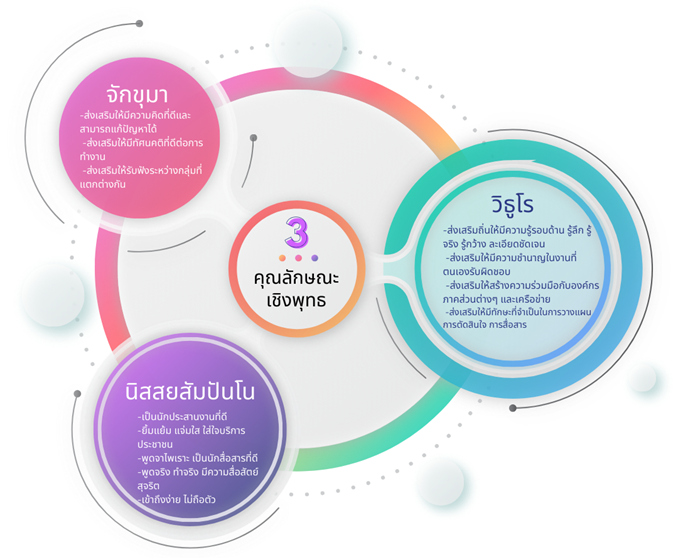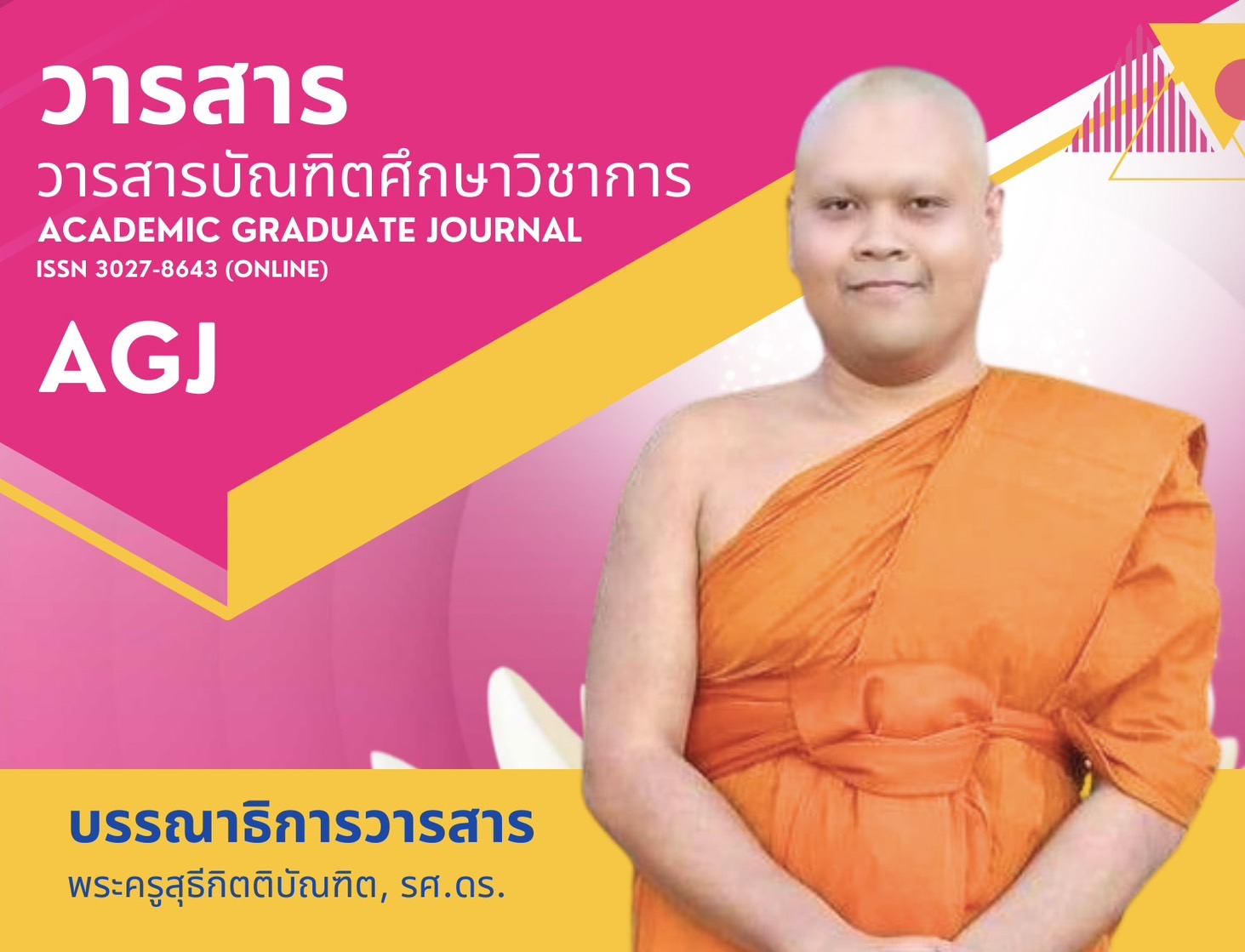BUDDHIST CHARACTERISTICS FOR PROMOTING POLITICAL LEADERSHIP OF LOCAL POLITICIANS SAMUT SONGKHRAM PROVINCE
Keywords:
Buddhist characteristics, leadership qualities, local politiciansAbstract
This research aimed to 1. investigate the characteristics promoting political leadership qualities and 2. present Buddhist principles to enhance the leadership qualities of local politicians. It employed a qualitative research approach, gathering field data from five key informant groups: local politicians, community leaders, political science scholars, religious scholars, and residents. Twenty-five individuals were selected through purposive sampling based on their representative roles within the respective groups. Semi-structured interviews with a Scale Content Validity Index (S-CVI) 1.00 were conducted as the data collection tool. Data analysis involved content and thematic content analysis of group discussions with ten qualified participants.
The research findings revealed that: 1. Characteristics promoting political leadership qualities among local politicians comprise four key attributes: 1.1 Influence skills, including organizing suitable and inclusive events, using authority judiciously and adhering to rules, building trust with the public, and creating significant opportunities. 1.2 Delegation skills include setting clear goals and tasks, clear and enthusiastic communication, fostering confident teams, and monitoring task progress. 1.3 Flexibility, demonstrated through perseverance and effort in facing challenges, listening to community and colleague feedback, and adapting to situations. 1.4 Motivational skills involving promoting individual development, fostering team confidence and enthusiasm, clear communication, and providing encouragement and energy to the team. 2. Integrated Buddhism to enhance political leadership revealed significant findings. The Chakkhuma aspect emphasizes having a broad vision, encouraging local politicians to generate innovative ideas and effectively tackle various local issues. It fosters a positive attitude towards sustainable and beneficial initiatives, enabling local politicians to envision the organization's goals and future directions. The Vithuro aspect signifies proficiency in both personal and public endeavours. Local politicians must possess a comprehensive, profound, genuine, broad, and detailed understanding, which stems from encountering and thoroughly studying challenges. Nissayasampanno underscores the importance of cultivating strong interpersonal relationships. It entails being an adept coordinator, prioritizing public service, eloquent communication, and practical interpersonal skills.
References
ดวงใจ ปินตามูล. (2560). การพัฒนาคุณลักษณะภาวะผู้นำมุ่งให้บริการของผู้บริหารองค์กรปกครองส่วนท้องถิ่นในจังหวัดเพชรบูรณ์ตามแนวพุทธธรรม (วิทยานิพนธ์ปริญญาปรัชญาดุษฎีบัณฑิต สาขาวิชารัฐประศาสนศาสตร์). พระนครศรีอยุธยา: มหาวิทยาลัยมหาจุฬาลงกรณราชวิทยาลัย.
ประเวศ วะสี. (2540). ภาวะผู้นำ (พิมพ์ครั้งที่ 2). กรุงเทพฯ: สำนักพิมพ์หมอชาวบ้าน.
พรเศรษฐี วุฒิปัญญาอิสกุล. (2564). การบูรณาการหลักธรรมาธิปไตยเพื่อส่งเสริมภาวะผู้นำทางการเมืองของนักการเมืองในจังหวัดนครราชสีมา (ดุษฎีนิพนธ์ปริญญาปรัชญาดุษฎีบัณฑิต สาขาวิชารัฐศาสตร์). พระนครศรีอยุธยา: มหาวิทยาลัยมหาจุฬาลงกรณราชวิทยาลัย.
พระธรรมโกศาจารย์ (ประยูร ธมฺมจิตฺโต). (2549). พุทธวิธีบริหาร (พิมพ์พิเศษ 5 ธันวาคม 2549). กรุงเทพฯ: มหาจุฬาลงกรณราชวิทยาลัย.
พระพรหมคุณาภรณ์ (ป.อ. ปยุตฺโต). (2546). ภาวะผู้นำ: ความสำคัญต่อการพัฒนาคน พัฒนาประเทศ. กรุงเทพฯ: ธรรมสภา.
พระมหาวัฒนะชัย ชยวฑฺฒโน. (2565). แนวทางการพัฒนาภาวะผู้นำตามหลักทุติยปาปณิกสูตรของผู้บริหารโรงเรียนพระปริยัติธรรม จังหวัดหนองคาย. วารสารศรีล้านช้างปริทรรศน์, 8(2), 1-13.
พระอนุสรณ์ วชิรวํโส. (2563). ภาวะผู้นำตามหลักทุติยปาปณิกสูตรของผู้บริหารโรงเรียนพระปริยัติธรรม แผนกสามัญศึกษา จังหวัดขอนแก่น. วารสารบัณฑิตศึกษามหาจุฬาขอนแก่น, 7(4), 238-249.
มหาจุฬาลงกรณราชวิทยาลัย. (2539). พระไตรปิฎกภาษาไทย ฉบับมหาจุฬาลงกรณราชวิทยาลัย. กรุงเทพฯ: โรงพิมพ์มหาจุฬาลงกรณราชวิทยาลัย.
วิกรม กรมดิษฐ์. (2551). มองซีอีโอโลก (พิมพ์ครั้งที่ 2). กรุงเทพฯ: บริษัท โพสต์พับลิชชิง จำกัด (มหาชน).
สมคิด จาตุศรีพิทักษ์. (2544). วิสัยทัศน์ขุนคลัง (พิมพ์ครั้งที่ 2). กรุงเทพฯ: ผู้จัดการ.
สาลินี รักกตัญญู. (2564). การส่งเสริมบทบาทของนักการเมืองสตรีท้องถิ่นเพื่อเสริมสร้างการบริหารจัดการองค์กรปกครองส่วนท้องถิ่นในเขตภาคเหนือตอนบน (วิทยานิพนธ์ปริญญาปรัชญาดุษฎีบัณฑิต สาขาวิชารัฐศาสตร์). พระนครศรีอยุธยา: มหาวิทยาลัยมหาจุฬาลงกรณราชวิทยาลัย.
สุรินทร์ธร ศิธรกุล. (2556). ผู้นำการบริหารกิจการบ้านเมืองที่ดีขององค์กรปกครองส่วนท้องถิ่นในเขตจังหวัดภาคตะวันออกเฉียงเหนือตอนล่าง (วิทยานิพนธ์พุทธศาสตรดุษฎีบัณฑิต สาขาวิชารัฐประศาสนศาสตร์). พระนครศรีอยุธยา: มหาวิทยาลัยมหาจุฬาลงกรณราชวิทยาลัย.
Gomez-Mejia, L. R., & Balkin, D. B. (2002). Management. New York: McGraw-Hill Book Company.







